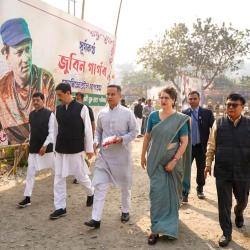A solidarity action expressing deep respect for Irom Sharmila and supporting the ongoing struggle for justice by civil society in Manipur, was organized Tuesday at Jantar Mantar in New Delhi. The solidarity event saw a large turn-out of over a hundred people, despite a rainy day.
Participants included women’s movement activists Shanti, Runu Chakraborty and Nandini Rao; author of Irom Sharmila’s biography “Burning Bright” Deepti Priya Mehrotra; human rights activists Devika Mittal, Ravi Nitesh, Shruti Achesh and Rita Manchanda; historian Uma Chakravarty; Monisha Behl of North-East Network; senior journalists Pamela Philipose and Sujata Madhok (President, Delhi Union of Working Journalists); Servants of the People Society Trustee, octogenarian Satya Paul; Activist Dipak Dholakia, NAPM (National Alliance of People’s Movements) activists Shabnam and Vimal bhai; theatre activists Nisha and Afaqullah (he came from Faizabad, U.P, and joined in singing IPTA songs); R.Geetha of Penuramma Iyakkam, Chennai; Sagari Ramdas and Madhoo who work with tribal groups in Andhra Pradesh; labor activist Rakhi Sehgal; academicians Mary John, Felix Padel and Anuradha Marwah Roy; NGOs Sama and Saheli; students from JNU, Delhi University, South Asia University and several others. The solidarity action was organised by two autonomous groups, Sampurna Trust and Save Sharmila Solidarity Campaign.
The people gathered sang movement songs -- songs of struggle, such as ‘Tu zinda hai to zindagi ki jeet mein yakeen kar’ and ‘Khamoshi todo vaqt aa gaya’. Several persons have been inspired by Sharmila over the years, and this was evident in the energy of the gathering. Some read out poems they have written about Sharmila, including Sagari Chhabra: “You resist violence by denying yourself taste/ Make haste, oh world, listen to this voice….”
The gathering noted that on August 9, 1942, the British government arrested Mahatma Gandhi and other leaders, and on August 15, 1942, it promulgated the Armed Forced Special Powers Ordinance, to quell the Quit India movement. In 1958, the Indian government promulgated the Armed Forces Special Powers Act (AFSPA), and subsequently imposed it in several parts of the country. People in Manipur, including human rights and women activists, are struggling for AFSPA to be repealed. The Act perpetuates violation of fundamental democratic rights by granting excessive powers, and impunity, to armed forces. Recently, the Supreme Court of India ruled that over 1,500 cases of alleged `fake encounters’ in Manipur are to be thoroughly investigated; the first six cases investigated have all been proved to be fake encounters: killing of innocent individuals, by armed forces or police commandos.
The convention agreed that “humane, democratic solutions are needed to solve real problems faced by people; dialogue rather than repression.” Each person lit a candle or a diya, as a mark of the continuing struggle for justice, peace and democracy in Manipur and the rest of the country. It is not necessary for one person to take the struggle onto her shoulders: the burden is shared by others in civil society. The group noted, “We care for democracy, peace, good governance and justice, and feel that we are all responsible for helping to bring this about. We need to listen, learn, and together search for ways to move ahead, to actually resolve many very difficult situations.”
- 8348 reads










Add new comment